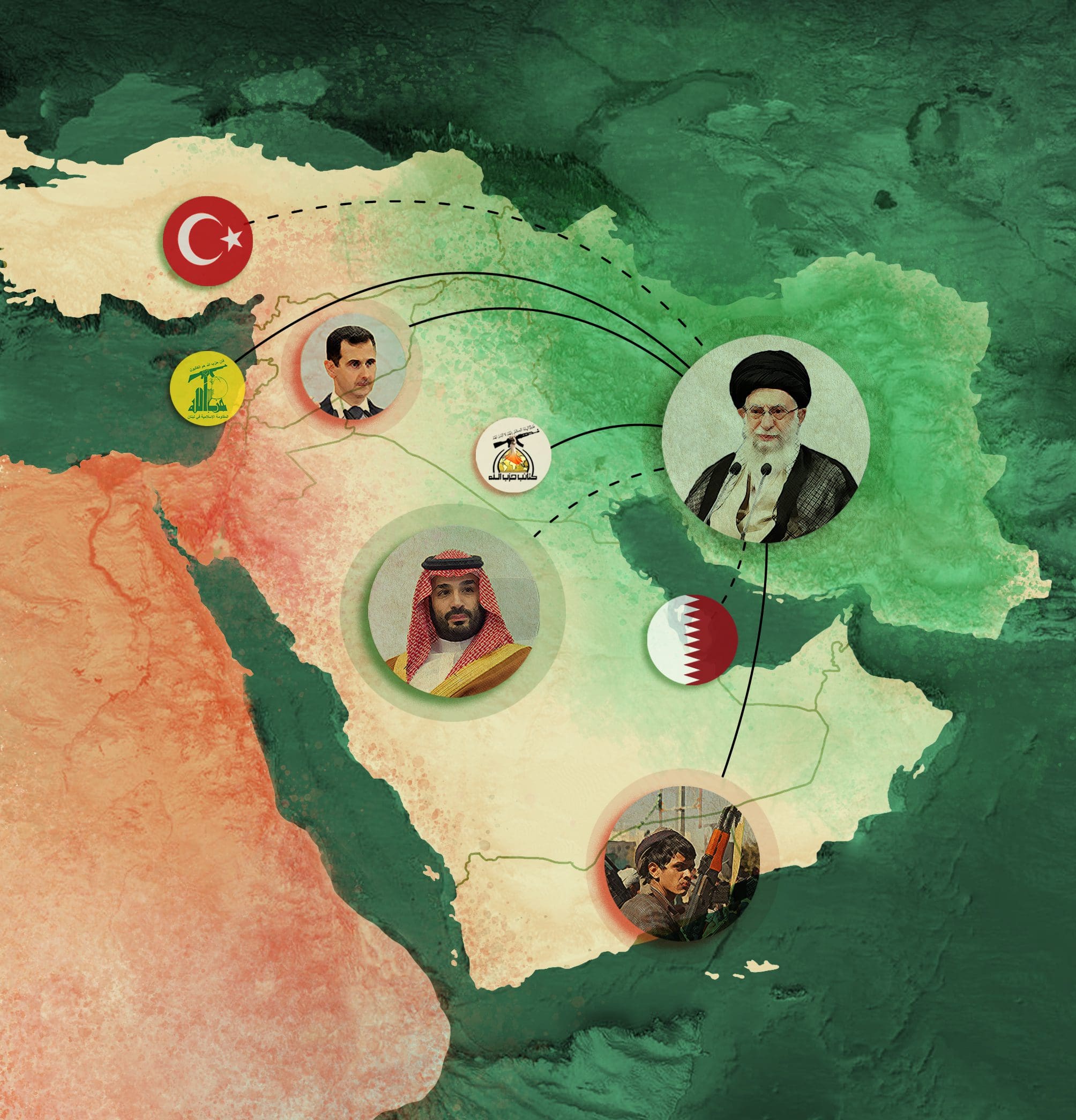
Iran-Syria Relations Amid Regional Reset Dynamics
April 2024
Since the inception of the 1979 Islamic Revolution in Iran, the relationship between Iran and Syria has been notably strong. This alliance was further solidified during the tumultuous period of the Syrian civil war, which commenced in 2011. Throughout this conflict, Iran emerged as a steadfast supporter of Syrian President Bashar Assad, offering his regime substantial military and financial backing.1 This unwavering support was not merely a testament to the two regimes’ alliance, but also an indication of Iran’s strategic interests in the region.2
More recently, the Middle East has experienced notable diplomatic and geopolitical transformations. Three pivotal regional reset trends have emerged, each bearing the potential to reshape the dynamics of Iran-Syria relations. Firstly, Syria’s reintegration into the Arab League in May 2023 marked a milestone in normalization between the country and Arab states.3 Secondly, the thawing of relations in March 2023 between regional rivals, Iran and Saudi Arabia, signaled a new era of potential diplomatic engagements.4 Indeed, these two dynamics are closely intertwined; Iranian and Saudi leaders’ decision to enhance relations facilitated Syria’s reintegration into the Arab League. Lastly, the growing trend of Arab states normalizing ties with Israel5 has introduced a new dimension to the regional calculus.
The core objective of this chapter is to explore the ramifications of these regional reset trends on Iran-Syria relations. Its central argument maintains that, while Assad’s burgeoning ties with Arab states afford Syria more autonomy from Iran, they do not necessarily equate to diminished Iranian influence in Syria, particularly in the military and security realms.
In this evolving scenario, Iran is likely to capitalize on the renewed engagements with its Arab counterparts—particularly those with Syria—to bolster and legitimize its regional stature. Yet, the shared animosity of Tehran and Damascus toward Israel stands in stark contrast to Arab-Israeli normalization, potentially muddying the waters of Arab states’ involvement in Syria.
Syria-Arab Normalization
In May 2023, after nearly a twelve-year suspension, Syria made its much-anticipated return to the Arab League.6 This significant development—following a decade marked by the Assad regime’s widespread atrocities against its citizens7—symbolized most Arab states’ reluctant acceptance of the Assad government as the official representative of Syria.
The Arab League’s decision to reincorporate Syria was not so much an endorsement of Assad’s regime but rather a recognition of the unavoidable geopolitical realities shaped by his persistent grip on power. This move also underscored the divergence in perspectives between the Arab world and the West on how to address the ongoing Syrian crisis.8 Moreover, there was intra-regional disagreement, as Qatar (and to a lesser extent Kuwait9) remained critical of re-establishing ties with the Assad regime.10
From Iran’s vantage point, this development raised intriguing questions. While some analysts believe that the Arab states’ acceptance of Assad was primarily motivated by a desire to counterbalance Iran’s influence in Damascus, others offer a contrasting view.11 In fact, Tehran viewed Syria’s return to the Arab League as a reaffirmation of Syria’s legitimacy and a “restoration of its power.”12 The Islamic Republic’s state media also highlighted Tehran’s influential role in facilitating Syria’s re-entry into the Arab League.13
The timing of the Arab League’s decision was particularly noteworthy, coming on the heels of a landmark deal between Iran and its primary regional adversary, Saudi Arabia, ending seven years of overt hostility. This rapprochement was likely key to Syria’s readmission to the Arab League.
Overall, Tehran’s official stance on Syria’s reintegration was positive. Iranian Foreign Ministry Spokesman Nasser Kanaani lauded the move as supportive of “overall stability and peace” in the region.14 Similarly, Ali-Asghar Khaji, a senior advisor to Iran’s foreign minister highlighted the benefits reintegration would bring to regional security.15
However, the evolving landscape presents both opportunities and challenges for Iran. While Syria’s re-entry into the Arab League could bolster its economic recovery, potentially offering Iran avenues for economic collaboration with certain Arab states, there are underlying concerns. Crucially, enhanced Arab engagement in Syria might overshadow Iran’s economic interests.16 Additionally, the potential for Arab states to influence the Syrian government toward limiting Iran’s military activities in the territory, or toward normalization with Israel,17 has raised concerns in Tehran, even if the latter outcome seems distant amid the war in Gaza. In essence, while Syria’s reintegration into the Arab League might not drastically alter Iran’s plans in Syria, it does necessitate a recalibration of Tehran’s strategies in the face of new challenges.
Iran-Saudi Reconciliation
The thawing of relations between Iran and Saudi Arabia in March 2023 was a significant event in the region’s diplomatic landscape. Historically, the two powers’ rivalry has caused tension, with their differing positions shaping many conflicts and shifts in power throughout the Middle East.
For Syria, this reconciliation carries a multitude of implications. The renewed diplomatic ties between Iran and Saudi Arabia could contribute to easing tensions between Syria and its Arab neighbors. With Iran on board, Syria may have more opportunities to engage with other Arab nations. The Syrian regime has openly expressed its support for the Iran-Saudi rapprochement, viewing it as a harbinger of regional stability.18 Furthermore, Iran’s willingness to facilitate cooperation between Damascus and Riyadh underscores Tehran’s commitment to fostering stronger ties between its close ally, Syria, and the broader Arab world.19
However, with Iran no longer encountering the same degree of rivalry from its Arab neighbors, it may be more inclined to amplify its influence in Syria and throughout the region more assertively. Nevertheless, Tehran will likely strive not to directly challenge the interests of the Gulf states. The United States and Israel, could perceive an empowered Iran in Syria as a threat to their security interests.
Moreover, while the reconciliation might bolster economic cooperation in Syria between Iran and Arab states, it does not necessarily guarantee a reduction in Iran’s military presence in Syria. Arab states of the Gulf have long expressed concerns about Iran’s military footprint in Syria and its support for various militias. These concerns are unlikely to dissipate overnight, even with improved diplomatic relations.
As such, while promising on the surface, the Saudi-Iran rapprochement presents a complex web of opportunities and challenges for Syria. While it opens doors for economic and political cooperation, it also brings to the fore the delicate balance of power that exists in the region. The coming years will determine whether this reconciliation will usher in a new era of stability or surface fresh challenges in Syria and the region.
Arab-Israeli Normalization
The ongoing normalization of relations between several Arab states and Israel also holds implications for Iran’s interests and role in Syria. The Abraham Accords inaugurated this process in 2020, with the United Arab Emirates and Bahrain taking the lead.20 Subsequently, other Arab states have solidified their ties with Israel or are in the process of doing so. However, not all Arab countries are on board with this trend. Notably, Qatar21 and Kuwait22 have refrained from normalizing relations with Israel and show no immediate signs of doing so.
Nevertheless, the Arab-Israeli normalization process undeniably carries implications for Iran-Syria relations. As more Arab states attempt to align with Israel and Syria simultaneously, Arab states might find it increasingly challenging to support the Syrian government in its current configuration, given its close political and military alliance with Iran, which staunchly opposes Israel.
Conversely, Iran might view Syria as an even more vital, strategic asset amidst the trend of regional states normalizing with Israel, leading to a deeper entrenchment of Iranian influence in Syria. This could escalate Iran-Israel tensions, potentially drawing Syria into the fray. Similarly, the recent war in Gaza adds another layer of complexity. The war temporarily paused the discussions on normalization between Israel and Saudi Arabia, although it did not entirely halt them. But in any case, the Gaza war serves as a stark reminder of the longstanding issues in the region and could make Arab states more cautious in their approach toward Israel.
Therefore, while the Arab-Israeli normalization process promises a new era of cooperation, it also introduces fresh challenges. The reluctance of countries like Qatar and Kuwait to normalize, combined with the ramifications of the Gaza war, ensures that the regional dynamics remain fluid and complex, with Iran-Syria relations at the heart of many unfolding events.
Conclusion
The Middle East stands at the cusp of transformative shifts. Central to these changes are three regional reset trends: Syria’s reintegration into the Arab League, the rapprochement between Iran and Saudi Arabia, and the Arab-Israeli normalization process. Each of these developments carries profound implications for the dynamics of Iran-Syria relations.
Firstly, Tehran interprets Syria’s reintegration into the Arab League as a broader recognition of Bashar Assad’s regime and, more importantly, an endorsement of the Iran-backed “Axis of Resistance.” From this perspective, Syria’s reintegration not only bolsters Iran’s position in Syria but also legitimizes its broader regional strategy.
Simultaneously, Iran expects its reconciliation with Saudi Arabia to enhance its influence in Syria. Particularly, it could pave the way for cooperation with Arab states in rebuilding Syria’s war-torn economy. Iran, leveraging its longstanding support for Assad, could position itself as a key player in Syria’s reconstruction, eyeing strategic sectors such as infrastructure and energy.
However, the growing trend of Arab-Israeli normalization presents a challenge for Iran, especially given the war in Gaza. For Tehran, the war proves the importance of keeping Syria aligned with its anti-Israeli stance. This alignment serves a dual purpose: It counters Arab-Israeli normalization and maintains Syria as a critical ally in Iran’s broader regional strategy. However, at the same time, intensifying Arab-Israeli relations might eventually draw Syria into direct conflicts, further complicating regional dynamics.
So far, Damascus has maintained a restrained stance in the Gaza conflict, steering clear of direct military engagement. However, the escalation of activities by Iran-backed militias against Washington’s interests, which prompted a U.S. response against these militias in eastern Syria and in Iraq, demonstrated that the conflict could readily extend into Syrian territory.23 Assad likely hoped that by avoiding direct engagement in the war, Syria could prevent further destabilization and avoid becoming entangled in regional conflicts. This strategy would allow it to uphold its alignment with Iran’s anti-Israeli position without worsening its already precarious internal situation or risking a direct confrontation. But even this approach might change in the future, especially if Assad consolidates control over the rest of Syria’s territory and becomes emboldened by his regime’s increasing diplomatic legitimacy.
Overall, these developments compel Iran to adopt a more assertive stance in Syria. Tehran is keen on not just maintaining but expanding its influence in the country. For Arab states, these trends pose a significant strategic dilemma. Balancing their growing ties with Damascus and improving relations with Tehran against their relationships with Israel is becoming increasingly challenging. Their individual national interests and the broader geopolitical currents shaping the region further complicate this balancing act.
Moreover, the potential for increased tensions between Iran and its adversaries, primarily the United States and Israel, casts a shadow over Syria’s future. The country risks remaining a battleground for regional power struggles, undermining its prospects for stability and recovery. In essence, the evolving Iran-Syria relationship—set against the backdrop of shifting regional alliances and geopolitical strategies—is indicative of the complex interests shaping the Middle East. As these trends unfold, they will undoubtedly have far-reaching implications not only for Iran and Syria but for the entire region.


